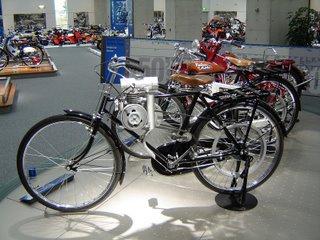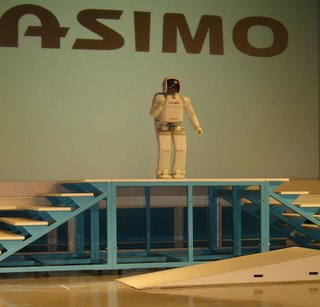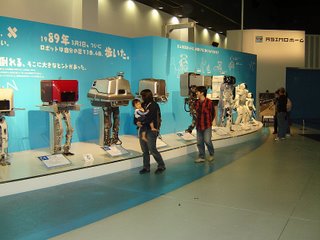Less than a decade old, and built by Honda, it's a pretty impressive place even for the uninterested in motor sports person, such as me. Here's a pic of part of the racetrack, where they have Indy races:

It's a big complex, with a hotel and camp area, go cart track, kiddie rides and technology centre.
Of particular rev-head interest is the Honda Collection Hall. It seems to contain examples of just about every model car, cycle or doo-dad that Honda has built. Also included is this replica of the first motor cycle ever built (by a Mr Daimler in 1885):

[Have a look at that seat. I guess they figured they were building a horse replacement, so why not have a seat that is just like a saddle.]
There is also this:

The caption says that this bicycle engine produced in 1947 was the first product to bear the Honda name.
At the other end of the scale is this shiny metal monster:

[Sorry but I seem to have missed taking a pic of the sign, so I am not sure what recent model it is.]
But for a nerdy person like me, the favourite part of the complex is that it is a home to this:


Asimo, the Honda robot, which puts on a demo a couple of times a day. He walks up the stairs, waves a lot, follows the cute human around etc. It's interesting, but also shows how we're a long, long way from Astroboy or I Robot. (Technology really evolves in unexpected ways, doesn't it? Robots, artificial intelligence and human space exploration are so far behind where the 1960's seemed to indicate we would be. On the other hand, the way everyone, even my 82 year old mother, uses the internet was hardly seen coming. Heinlein in the 40's and 50's had it nearly perfectly wrong when he had highly reliable rocketships that were navigated using slide rules. Anyway, I digress.)
This pic shows the evolution of Asimo. I like the earlier versions which are like a microwave on legs:

Once again, I refer readers to Wikipedia for more detail about this complex. Seems from that article that the design of the track has met with some complaint. Here's the official (English) website too.



